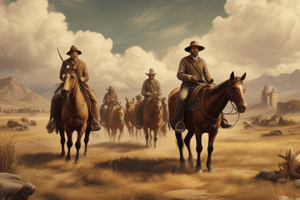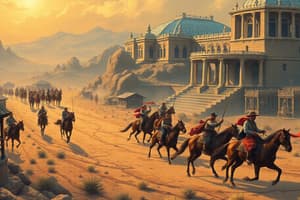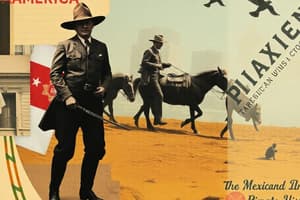Podcast
Questions and Answers
What were the economic factors that inspired westward expansion?
What were the economic factors that inspired westward expansion?
- Search for educational opportunities
- Quest for better healthcare
- Need for additional military bases
- Desire for land and resources (correct)
What role did Romanticism play in the westward migration?
What role did Romanticism play in the westward migration?
- It promoted industrialization in the west
- It focused solely on urban development
- It encouraged slavery in new territories
- It inspired the ideal of individualism and freedom (correct)
Which party supported westward expansion during the mid-19th century?
Which party supported westward expansion during the mid-19th century?
- Whig Party
- Republican Party
- Democratic Party (correct)
- Federalist Party
What was the primary motivation behind the Wilmot Proviso?
What was the primary motivation behind the Wilmot Proviso?
What did the Fugitive Slave Act of 1850 require?
What did the Fugitive Slave Act of 1850 require?
What was 'Bleeding Kansas'?
What was 'Bleeding Kansas'?
What was the primary intent behind John Brown's raid on Harper's Ferry?
What was the primary intent behind John Brown's raid on Harper's Ferry?
What were the major terms of the Compromise of 1850?
What were the major terms of the Compromise of 1850?
What ruling did the Supreme Court declare in the Dred Scott case?
What ruling did the Supreme Court declare in the Dred Scott case?
What is the primary goal of abolitionists compared to anti-slavery/free soil advocates?
What is the primary goal of abolitionists compared to anti-slavery/free soil advocates?
What was a significant change in political parties in the 1850s and 1860s?
What was a significant change in political parties in the 1850s and 1860s?
How did Lincoln differentiate himself in the 1860 presidential election?
How did Lincoln differentiate himself in the 1860 presidential election?
What was the purpose of compromises like the Missouri Compromise?
What was the purpose of compromises like the Missouri Compromise?
What was one effect of the Caning of Charles Sumner on national politics?
What was one effect of the Caning of Charles Sumner on national politics?
What reason did Southern leaders give for their secession from the Union?
What reason did Southern leaders give for their secession from the Union?
What marked Lincoln's Emancipation Proclamation as a limited action?
What marked Lincoln's Emancipation Proclamation as a limited action?
What resource advantage did the Union possess over the Confederacy?
What resource advantage did the Union possess over the Confederacy?
How did Andrew Johnson's plan for Reconstruction differ from Lincoln’s?
How did Andrew Johnson's plan for Reconstruction differ from Lincoln’s?
What were Black Codes designed to accomplish?
What were Black Codes designed to accomplish?
What was the Tenure of Office Act and its significance?
What was the Tenure of Office Act and its significance?
How was the winner of the 1876 presidential election controversially determined?
How was the winner of the 1876 presidential election controversially determined?
What was 'hard war', and why was it emphasized by Union commanders?
What was 'hard war', and why was it emphasized by Union commanders?
Flashcards
Manifest Destiny
Manifest Destiny
The belief that the United States was destined to expand westward across North America.
Wilmot Proviso
Wilmot Proviso
A proposal to ban slavery in any territory acquired from Mexico.
Compromise of 1850
Compromise of 1850
A series of laws that tried to resolve the issue of slavery in newly acquired territories.
Fugitive Slave Act
Fugitive Slave Act
Signup and view all the flashcards
Popular Sovereignty
Popular Sovereignty
Signup and view all the flashcards
Bleeding Kansas
Bleeding Kansas
Signup and view all the flashcards
Mexican-American War Causes
Mexican-American War Causes
Signup and view all the flashcards
John Brown's actions
John Brown's actions
Signup and view all the flashcards
Dred Scott Decision
Dred Scott Decision
Signup and view all the flashcards
Abolitionists vs. Free Soilers
Abolitionists vs. Free Soilers
Signup and view all the flashcards
1850s-60s Party Changes
1850s-60s Party Changes
Signup and view all the flashcards
1860 Presidential Candidates
1860 Presidential Candidates
Signup and view all the flashcards
Pre-Civil War Slavery Approach
Pre-Civil War Slavery Approach
Signup and view all the flashcards
Caning of Charles Sumner
Caning of Charles Sumner
Signup and view all the flashcards
Lincoln's 1860 Election Impact
Lincoln's 1860 Election Impact
Signup and view all the flashcards
Southern Secession Justification
Southern Secession Justification
Signup and view all the flashcards
Lincoln's Confederacy View
Lincoln's Confederacy View
Signup and view all the flashcards
Freedmen's Bureau
Freedmen's Bureau
Signup and view all the flashcards
Andrew Johnson's Background
Andrew Johnson's Background
Signup and view all the flashcards
Black Codes
Black Codes
Signup and view all the flashcards
Tenure of Office Act
Tenure of Office Act
Signup and view all the flashcards
1876 Election Outcome
1876 Election Outcome
Signup and view all the flashcards
Study Notes
Westward Expansion and the Mexican-American War
- Economic factors driving westward expansion included the search for land, resources, and economic opportunities like farming and mining.
- Romanticism, emphasizing nature and individualism, fueled westward migration.
- The Democratic Party favored expansion, while the Whigs were more cautious.
- Polk's 1844 election victory pushed for annexation of Texas and expansion in Oregon and California.
- Causes of the Mexican-American War included border disputes, U.S. expansionism, and Mexico's refusal to negotiate.
- Lincoln's "spot resolutions" challenged the war's justification, mirroring anti-war sentiment.
- Thoreau protested the war through civil disobedience, famously writing "Civil Disobedience."
The 1850s: Sectional Tensions Intensify
- The Wilmot Proviso proposed banning slavery in Mexican-acquired territories, escalating sectional conflict.
- The Compromise of 1850 included California’s admission as a free state, a stricter Fugitive Slave Act, and popular sovereignty in other territories.
- The Fugitive Slave Act of 1850 forced Northerners to return runaway slaves which increased anti-slavery sentiment.
- Southern Californians opposed California's free-state status due to its impact on Southern political power.
- The Kansas-Nebraska Act allowed territorial residents to decide on slavery through popular sovereignty.
- Popular sovereignty was the idea that settlers in territories voted on slavery's legality.
- Bleeding Kansas involved violence over slavery, with John Brown's involvement in anti-slavery attacks.
- John Brown attacked a federal armory at Harper's Ferry to ignite a slave rebellion.
- The Dred Scott Supreme Court decision ruled African Americans weren't citizens and Congress couldn't prohibit slavery in territories.
- The Supreme Court's decision aimed to permanently define slavery's legality.
- Abolitionists sought to abolish slavery everywhere; anti-slavery/Free Soilers opposed its expansion.
- The Republican Party emerged as a political opposing slavery's expansion.
- The 1860 presidential candidates had varied stances on slavery and the Union: Lincoln opposed expansion; Douglas supported popular sovereignty; Breckenridge supported expansion; Bell wanted a unified Union without a stance on slavery.
- The pre-Civil War approach to slavery involved compromise and attempted resolutions to avoid conflict.
- The Caning of Charles Sumner escalated sectional tensions. This event influenced the 1856 presidential election, favoring the Republican Party.
The Civil War
- Lincoln's 1860 election prompted Southern secession due to fears about slavery's future. This was a departure from previous era elections as Lincoln was elected without support from the South.
- Confederate and Union soldiers fought for honor, duty, and protection of their homes. Union soldiers fought to preserve the Union, while Confederates fought for states' rights and slavery.
- Military service to Black men in the North provided the chance to fight for freedom and equality.
- The Emancipation Proclamation freed enslaved people in Confederate states, excluding border states for strategic union maintenance.
- Lincoln refused to recognize the Confederacy as a separate entity to preserve the Union.
- "Hard war", a tactic of total war used by commanders like Grant and Sherman, employed aggressive actions to destroy Confederate resources. This led to civilian suffering but aimed for a quicker war conclusion.
- The Union held more resources and manpower, while the Confederacy had better military leadership and battlefield knowledge.
Reconstruction
- Lincoln's Reconstruction aimed to gently reintegrate the South, contrasting with Radical Republicans' harsher approach and Johnson's similar yet more lenient proposal. Different viewpoints resulted from varying perspectives and backgrounds.
- The Freedmen's Bureau aided freedmen through education, healthcare, and legal assistance.
- Johnson, a Southern Democrat and former slave owner, differed significantly from Lincoln's nationalistic stance.
- Black Codes restricted African Americans' rights, maintaining a labor force through labor contracts but excluding freedoms like land ownership.
- The Tenure of Office Act restricted presidential power to remove officials without Senate approval; it was involved in Johnson's impeachment.
- The 1876 election outcome was determined by a disputed Electoral Commission due to widespread voter fraud and contested results.
Studying That Suits You
Use AI to generate personalized quizzes and flashcards to suit your learning preferences.




